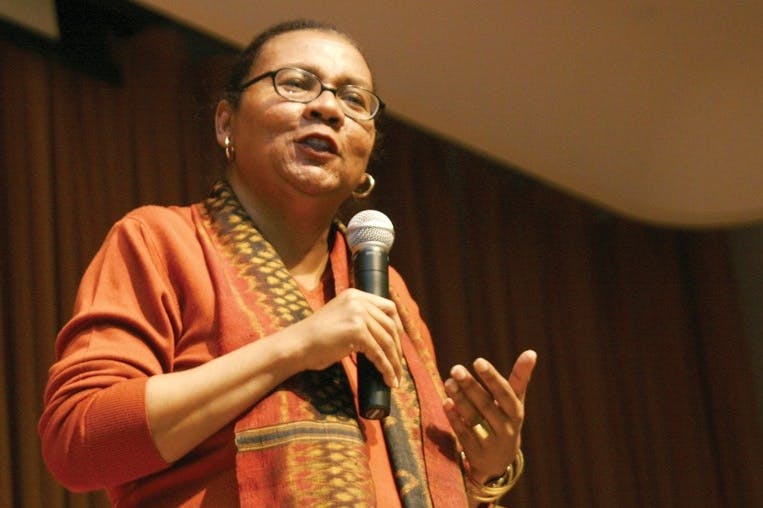Biography Shines Light on a Poet, Autobiographer, and Feminist Theorist Who Explored Black Experience
A metabiography, this work questions the purposes of autobiography and biography as bell hooks did herself — joining a formidable group of scholars that Aneta Ostaszewska quotes and discusses.

‘Becoming bell hooks: A story about self-empowerment of a Black girl who became a feminist’
By Aneta Ostaszewska
University of Warsaw Press, 161 pages
Available Here
The pseudonym of Gloria Jean Watkins (1952-2021) was bell hooks. She was educated at Stanford University and became a professor at Yale University, City College of New York, and Berea College, founded in 1855 at Lexington, Kentucky, as the first integrated co-educational college in the South.
A poet, autobiographer, and feminist theorist, hooks published 37 books exploring Black experience in the context of her own family, and of the Black and white institutions of American society. Her use of lowercase letters created a “writer-identity” for a woman who took the name of her great-grandmother, a bold and proud Black woman whose example buoyed hooks as she confronted a mother and father opposed to their child’s dogged desire to become a writer.
In defiance of the beatings and other abuse she had suffered in her family home, and rejecting her parents’ demand that she remain at Hopkinsville, Kentucky, a segregated small town, hooks traveled to California and made a new life for herself — though it included a male partner who also behaved violently toward her.
What makes hooks stand out in her books, such as “Ain’t I a Woman? Black Women and Feminism,” is her uncompromising investigation of sexism, racism, and the way the press and educational institutions marginalized Black women.
In “Bone Black: Memories of Girlhood,” hooks drew on her own childhood to deal with fraught memories of being locked in a closet and told that her desire to read and write would drive her crazy. Autobiography became a form of release from experiences that would have otherwise haunted her. In her writing, she was able to reconstitute her own identity, which included leaving her abusive partner.
Aneta Ostaszewska has written a metabiography, a work that questions the purposes of autobiography and biography as hooks did herself — joining a formidable group of scholars that Ms. Ostaszewska quotes and discusses.
Her biographer suggests hooks turned to autobiography so that she could present her life “again and again — and perhaps differently,” as scholar Anna Giza, quoted by Ms. Ostaszewska, suggests about the motivations of autobiographers.
Most biographers have a story to tell, but in a metabiography it is just as important to question the assumptions and methods biographers adopt to shape their narratives. So the first part of “Becoming bell hooks” deals with the academic universe in which hooks thrived, and includes sections on “Autobiography as a research field,” “Biographical works as a tool of self-empowerment,” and “the research approach” to both autobiography and biography.
Readers may be put off by this book’s academic jargon and impatient with repetitious arguments, eager to get to the biography of hooks that does not begin until page 88. Yet Ms. Ostaszewska is doing the work of bell hooks by showing how an individual’s life arises out of social, political, and ideological stresses that hooks experienced not only in the realm of Black experience but in the world of white feminists and male chauvinists in and out of academia.
The second part of Ms. Ms.Ostaszewska’s book includes sections titled “Reconstruction of bell hooks’s biography,” “bell hooks as a narrator, biographical subject and observer,” and “Reception and criticism: bell hooks’s self-empowerment.” For all her theoretical sophistication, hooks grounded her understanding of writing and of her life by returning to reminiscences of her grandmother’s quilting, and how “small pieces of fabric” are a form of autobiography, “made up of small, often fragmented memories put together.”
In an Afterword, “to read bell hooks,” Ms. Ostaszewska writes about the relevance of hooks to her biographer and to contemporary Poland and what happened after 1989, when communism was overthrown but women experienced an “exclusion and marginalization” similar to what Black women have suffered in America.
Ms. Ostaszewska believes that hooks’s call for a community of women who will be “heard and recognized” applies precisely to what Polish women are striving for: “to have their voices heard and recognized. Since they are disenfranchised, having a space where they can share their experience is crucial for empowerment.”
Mr. Rollyson is the author of “A Higher Form of Cannibalism? Adventures in the Art and Politics of Biography” and “To Be a Woman: The Life of Jill Craigie.”

